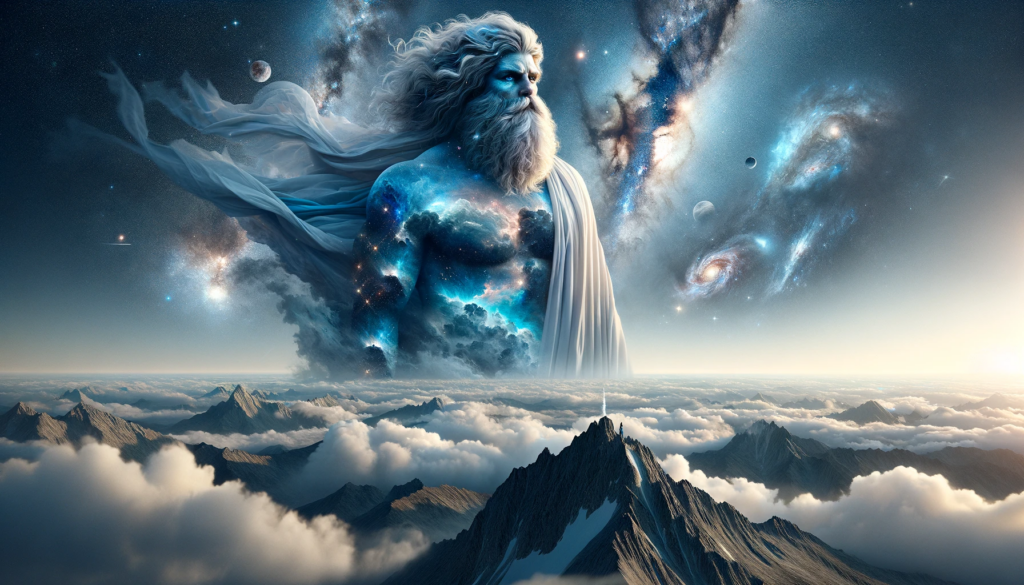The God of the Sky and the Starry Heavens.
Uranus is one of the old gods in Greek mythology. He was the primordial god of the sky and the starry heavens.
He ruled the universe, and his name means sky or heaven. Uranus literally was the sky, which the Greeks envisioned as a brass dome studded with stars. He was the husband of Gaia, or Earth and was not only her husband, but her son too.
In some stories Gaia, who is the mother of all living things, conceived Uranus without a father. In others, the father of Uranus is Aether or Chaos.
The Uranus and Gaia Line
Together, Uranus and Gaia had many offspring, including the Titans, pre-Olympian gods and goddesses; the Cyclopes, the one-eyed giants and the Hecatoncheires, giants who had fifty heads and one hundred hands.
- There were six male and six female Titans. The males were Oceanus, Crius, Iapetus, Hyperion, Cronus and Coeus.
- The goddesses were Theia, Rhea, Themis, Mnemosyne, Phoebe and Tethys.
- The Cyclopes were Brontes, Steropes and Arges, and the Hecatoncheires were Cottus, Briareos and Gyges.

According to myth, Uranus came to Gaia every night and sired the children upon her, but he disliked all of them. He considered them threats to his power. Though his Titan children could be quite beautiful, Uranus was so repelled by the sight of the Hecatoncheires that he tried to push them back into Gaia’s womb, which caused her terrible pain. Eventually, Uranus imprisoned the Cyclopes and the Hecatoncheires in Tartarus, a gloomy place that lay beneath the Earth or Hades.
This caused Gaia to resent Uranus even more, and she plotted with her Titan children to at least overthrow him, since Uranus was immortal and couldn’t be killed. Only her youngest son Cronus agreed to the plot, because he wanted to replace his father as leader of the gods. Gaia fashioned a sickle of flint and gave it to him.
The Betrayal of Uranus
One night, when Uranus came to Gaia, his sons ambushed him and held him down while Cronus used the sickle to castrate him. He threw both the sickle and Uranus’ genitals into the sea. The blood from the mutilation fell on the earth and gave rise to the Gigantes, or Giants; the ash tree nymphs called the Meliae and the Furies, or the Erinyes. Some myths claim that the Telchines, gods who settled the isle of Rhodes, were also born at this time. The goddess Aphrodite arose from the genitals that were tossed into the sea.
The Giants
The Giants were not necessarily large, but they were very aggressive and fought the Olympian gods. The Meliae helped to raise Cronus and Rhea’s son Zeus after Rhea needed to hide him from Cronus, who would have swallowed him as he’d swallowed Zeus’ other brothers and sisters.
The Furies
The Furies were the goddesses of vengeance. These fearful looking beings had the look of hideous old women with bloodshot eyes. They had snakes for hair and bat wings and tormented their victims with brass scourges. The very sight of them drove the guilty mad. Folklorists aren’t sure how many Furies there were, but the poet Virgil named three of them. They are Alecto, Megaera and Tisiphone. Aphrodite, born on the sea foam, was the goddess of love and beauty.
The Titans
When Uranus was mutilated he called his sons Titanes, or “straining ones” for their betrayal and prophesied that Cronus would also be overthrown by his children. This eventually came to pass when the Olympian gods overthrew the Titans. Uranus’ deposition is symbolic of the archaic gods overthrow in an age before time. Cronus’ own name suggests that he was an embodiment of time. That he used a sickle made of flint and not of forged metal also speaks of prehistory.
Just as Uranus had prophesised the overthrow of Cronus, he also prophesised the further betrayal of Zeus over his Titan siblings. That they themselves would go through horrific punishment, cast into the pit of Tartarus for their murderous crimes.
As Uranus could no longer impregnate Gaea, he simply took up his place as the bowl of the sky who was held aloft by his grandson Atlas, the son of Uranus’ son Iapetus and Clymene, an ocean nymph.
The god Uranus gave his name to a planet, the first one discovered through a telescope. Uranus, with its featureless, blue-green disk, is the only planet to be named after a Greek and not a Roman god.
Symbols and Sacred Animals
As the personification of the sky, Uranus himself is a symbol of the heavens. He was imagined as a vast, starry dome that covered the earth, representing the sky.
There is no specific animal strongly or directly associated with Uranus in the way that, for example, the owl is associated with Athena or the peacock with Hera. This lack of association might be due to his more abstract and overarching nature as a personification of the sky.
Uranus’s role in mythology is primarily as a progenitor. With his most significant mythological act being his union with Gaia (the Earth) from which many of the earliest deities were born.
Link/cite this page
If you use any of the content on this page in your own work, please use the code below to cite this page as the source of the content.
Link will appear as Uranus – God of The Sky: https://greekgodsandgoddesses.net - Greek Gods & Goddesses, February 10, 2017